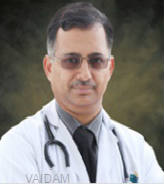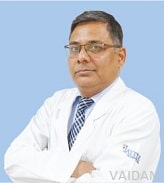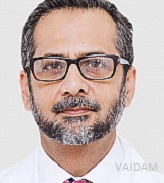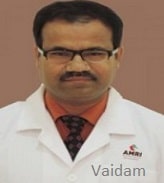Alzheimer Disease Treatment cost in India for Indian Patients is between Rs.8880 to Rs.11840. Cost for International patients is between USD 180 to USD 220.
Patient has to stay in the hospital for 1 days and outside the hospital for 25 days. The total cost of the treatment depends on the diagnosis and facilities opted by the patient.Listing approximate price of Alzheimer Disease Treatment and some related procedures. The prices may change depending upon the centers and condition of the patient.
| Treatment name | Cost range |
|---|---|
| Alzheimer’s Disease Treatment | Rs.8880 to Rs.11840 |
The price varies across the cities. Tier 1 Cities are usualy more expencive thane tier 2 cities. The price for Alzheimer Disease in different cities in India is approximately in the range of:
For patients planning to travel abroad it is useful to know the price in destinations popular with medical travellers. The price for Alzheimer Disease in different countries is approximately:
Listing popular specialists:

Director, 19 years of experience

Neurology , Headache, Movement disorders – Parkinson’s disease, dystonia, writer’s cramp, Myasthenia Gravis, Nerve and muscle disorders Multiple sclerosis

Senior Consultant, 14 years of experience

Neurological Problems, Neurological dysfunction, Headache

Senior Consultant, 15 years of experience

Stroke, Neurological Problems, Neuro Infections, Demyelinating diseases

Senior Consultant, 38 years of experience

Parkinson’s disease, Alzheimer’s disease, Stroke, Dizziness/vertigo, Balance disorder, Neck/back pain, Spinal cord disease, Weakness/paralytic diseases, Multiple sclerosis peripheral neuropathy

Consultant, 17 years of experience

Neuromuscular disorders, Brain mapping, Nerve and Muscle Disorders, Peripheral Nerve

Consultant, 42 years of experience

Vagus Nerve Stimulation (Epilepsy) Epilepsy surgery Nerve and Muscle Disorders Neurological Problems Sleep Disorder Treatment Paralysis Peripheral Nerve Fibromyalgia Treatment Epilepsy Treatment Vertigo Treatment Migraine Treatment Parkinson's Disease Treatment Dementia Treatment Alzheimer's Disease

Additional Director, 29 years of experience

Stroke, Headaches, Epilepsy, Multiple Sclerosis, Parkinson’s Disease

Consultant, 22 years of experience

Interventions, Epilepsy, Migraine, Headaches

Consultant, 18 years of experience

Headache Management Dementia Hypertension Migraine Treatment Paralysis Spondylosis Vertigo Movement Disorders

Consultant, 30 years of experience

Vagus Nerve Stimulation (Epilepsy) Endoscopic Carpal Tunnel Release Laminectomy (Cervical) with Fusion Total Disc Replacement Paralysis Lumbar Radiofrequency Neurotomy Skull Base Surgery Gamma-Knife Radiosurgery Peripheral Nerve Lateral Lumbar Interbody Fusion (XLIF) Laminectomy Attention Deficit Hyperactivity Disorder (ADHD) Treatment ALIF: Anterior Lumbar Interbody Fusion Pituitary Diseases Movement Disorder.

Consultant, 45 years of experience

Deep Brain Stimulation Lumbar Puncture Canalith Repositioning (CR) Gamma-Knife Radiosurgery Brain Tumor Surgery Vagus Nerve Stimulation (Epilepsy) Epilepsy surgery ACL Reconstruction Electroconvulsive Therapy (ECT) Vascular Surgery Insomnia Treatment Neuromuscular Disorders Attention Deficit Hyperactivity Disorder (ADHD) Treatment Video EEG.

Consultant, 18 years of experience

Nerve and Muscle Disorders Neurological Problems Neuromuscular Disorders Neurological dysfunction Stroke Treatment Headache Management Spinal Disorders Peripheral Nerve Vascular Brain Diseases Vertigo Treatment Epilepsy Treatment Skull Base Surgery Deep Brain Stimulation Lumbar Puncture Canalith Repositioning (CR).

Consultant, 17 years of experience

Paralysis, Acquired Loss of Brain Function, Botox Treatment, Tumors

Consultant, 23 years of experience

Deep Brain Stimulation Brain and Spinal surgeries Movement Disorders Parkinson’s Disease.

Director, 32 years of experience

<p class="rtejustify" dir="ltr">Dr. Mohit Bhatt is a Neurosurgeon in Mumbai, India, for various neurosurgeries, including:</p> <ul dir="ltr"> <li class="rtejustify">Deep Brain Stimulation </li> <li class="rtejustify">Treatment of Movement Disorders</li> <li class="rtejustify">Parkinson's Disease</li> <li class="rtejustify">Progressive Supranuclear Palsy</li> <li class="rtejustify">Wilson's Disease</li> <li class="rtejustify">Brain Iron Disorders</li> <li class="rtejustify">Neurogenetic diseases</li> </ul>

Senior Consultant, 36 years of experience

Dementia, Movement Disorders, Hypertension, Paralysis, Spondylosis, Vertigo

Consultant, 28 years of experience


Chairman, 40 years of experience

Stroke Neuroimmunology Behavioral Neurology

Consultant, 20 years of experience

Canalith Repositioning (CR), Parkinson's Disease Treatment, Stroke Treatment, Neuromuscular Disorders

Consultant, 22 years of experience

Seizures Neuropathy Alzheimer's disease Migraine Parkinson's disease
Our Services for Alzheimer Disease Treatment in India
Transparent - Professional - Without Hassles
Alzheimer’s disease has three different stages:
Along with little memory loss and difficulties learning, first-stage Alzheimer's disease can produce a lack of energy and spontaneity, as well as mood swings, disorientation, difficulty communicating, and difficulty organizing.
During the second stage of Alzheimer's disease, the patient begins to require assistance with anything more than simple tasks. Recent events and personal histories may be forgotten, and the present may be mixed up with the past.
Alzheimer's disease in its third stage causes total incapacity, including the loss of ability to feed oneself, communicate, identify others, and manage physiological functions. Memory deteriorates even further and may virtually disappear. The patient's poor physical state makes them vulnerable to additional illnesses and respiratory issues, especially if they are confined to bed.
Alzheimer's disease, according to researchers, has no single cause. It is most likely caused by a combination of variables such as genetics, lifestyle, and environment. Scientists have found risk factors for Alzheimer's disease. These proteins cluster together abnormally in the brain, producing plaques and tangles that disrupt normal brain function. While certain risk factors, like age, family history, and heredity, cannot be modified, emerging data shows that there may be others that may.
Alzheimer's is a progressive illness, meaning that the symptoms worsen over time. Symptoms, when they arise, and how they evolve over time will differ from person to person.
Dementia is a broader term that refers to a decrease in mental capacity that is severe enough to interfere with everyday living. The most prevalent cause of dementia is Alzheimer's disease. Alzheimer's is a distinct illness, although dementia is not. Because Alzheimer's disease affects the region of the brain linked with learning first, early symptoms frequently include abnormalities in memory, thinking, and reasoning abilities.
The great majority of Alzheimer's disease cases are sporadic, which means there is no family history of Alzheimer's or another dementia. Some cases of Alzheimer's disease, however, are "genetic" and are classified as Familial Alzheimer's Disease (FAD).
Women are more impacted by Alzheimer's disease; yet, because women live longer than males, the female population is substantially greater
There is no one clinical test that can be used to diagnose Alzheimer's disease. A complete examination comprises the following components:
While there is currently no cure for Alzheimer's disease, there are treatments that can help control or reduce its symptoms for a period of time, as well as assist manage specific diseases. Agitation, sadness, sleep problems, wandering, and psychosis (hallucinations or delusions) are some of the symptoms that may emerge as the condition advances.
Two therapies are available for treating Alzheimer’s disease:
Cognitive rehabilitation-This technique involves working with a trained professional, such as an occupational therapist, and a relative or friend to achieve a personal goal, such as learning to use a mobile phone or other everyday tasks.
There is now no conclusive data on what may be done to prevent Alzheimer's disease or age-related cognitive impairment. What we do know is that a balanced lifestyle, which includes a good diet, physical exercise, maintaining a healthy weight, and controlling high blood pressure, can reduce the risk of some chronic illnesses while also improving general health and well-being. Scientists are particularly interested in the idea that leading a healthy lifestyle might postpone, halt, or perhaps prevent Alzheimer's disease.
Every case is unique, and illness development differs from person to person. People with Alzheimer's disease might survive anywhere between 8 and 20 years after the start of symptoms.






NABH Certified Healthcare Discovery Platform
Vaidam is NABH certified healthcare discovery platform that will connect you to top-notch medical experts, hospitals, wellness options, and trusted travel partners to help identify and make the right healthcare choices.

Researched & Personalized Treatment Plan - Under One Roof
You can search for the best hospitals, read about them, view photographs of the facilities at the hospitals and the places at which the hospitals are located, and check the cost of treatment.

Quality Treatment Within Your Budget
As soon as you post an enquiry, the patient relation team will collect details from you, share them with the doctors and hospitals on Vaidam's panel, and get a personalized treatment plan. We research to get quality treatment within your budget.

Treatment to Travel
Vaidam concierge assists patients, to get medical Visa, the best airline fares and arrangements for your stay. Our concierge also helps you with daily travel, language, and food concerns. Vaidam does everything to be your perfect host. All of Vaidam’s services are free of cost to patients.

International Reach
Vaidam Health has network in 15+ countries, which includes India, Turkey, UAE, Germany, South Korea, Thailand, Malaysia, Spain.
Note: Vaidam Health does not provide medical advice, diagnosis or treatment. The services and information offered on www.vaidam.com are intended solely for informational purposes and cannot replace the professional consultation or treatment by a physician. Vaidam Health discourages copying, cloning of its webpages and its content and it will follow the legal procedures to protect its intellectual property